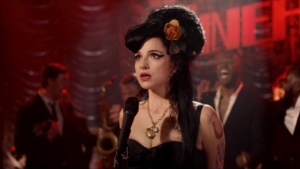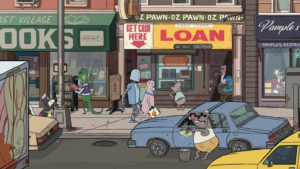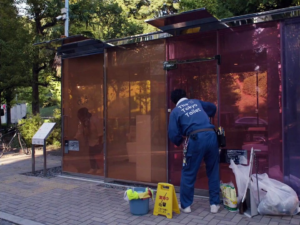Reviewed by GREG KING
Documentary
Director: Ron Howard.

In the 1960s The Beatles were the biggest band in the world, topping the charts and causing scenes of pandemonium and hysteria wherever they appeared. But their success changed both the music scene and the world forever.
Beatlemania swept the world in an era before social media, and everywhere that the band went they were mobbed by thousands of hysterical, weeping fans, the sort of frenzied adulation that the likes of Justin Bieber, One Direction and many of today’s teen idols can only dream of.
In this fascinating and informative documentary Oscar winning director Ron Howard (A Beautiful Mind, The Da Vinci Code, etc) explores the history of the group through lots of interviews and rarely seen archival footage, particularly concentrating on the years from 1963 to 1966 when the band toured extensively. The film chronologically follows the four lads from Liverpool from their early days playing in small clubs in their home city to the debauched city of Hamburg in Germany and on to the world stages with a triumphant tour of the US. The Americans got their first taste of The Beatles through their appearance on the Ed Sullivan Show in 1964, where they were watched by some 70 million viewers, including the young Howard, who was then still a child star on tv.
The band virtually invented stadium rock shows after they were advised that it was not safe to be playing to 5000 people inside a small venue when there were 50000 hysterical and screaming fans outside. The Beatles played a number of stadium shows, culminating in a gig at Shea Stadium in New York where they played before 56000 people. But the foursome also spoke out about segregation in the US, and insisted that they would not play Florida’s Gator Bowl if the audience was segregated.
In an interview, activist and lecturer Kitty Quinlan talks about the impact that this action had in overturning some of the racist policies of America’s deep south. There are interviews with a number of celebrities who recall their own personal experiences of attending a Beatles’ concert, including Whoopi Goldberg, Elvis Costello and Sigourney Weaver. There is even some footage of a young Weaver who can be seen rocking away in the crowd at a concert. There are also interviews with some of the people who worked closely with the band while on the road during that period.
But the extensive touring schedule eventually took its toll on the band, and they grew tired of merely going through the motions and became bored with it all. They quit touring in 1966 after a concert at San Francisco’s Candlestick Park, and concentrated on being a recording band working in the studio where they evolved into mature and creative artists and produced some of their most lyrically rich and thematically dense albums, including the seminal Sgt Pepper’s Lonely Hearts Club Band, which spent some three years in the charts and was hailed by Rolling Stone magazine as the greatest album of all time.
The film explores the highs and lows of their success. They occupied the top five spots on Billboard‘s Hot 100 singles chart, an unprecedented achievement; but there was also the controversy that surrounded Lennon’s comment that the Beatles were more popular than Jesus Christ. This comment saw a radio station in Birmingham, Mississippi, organise a mass bon fire of all things Beatle related. There is also a brief look at their foray into films with A Hard Day’s Night and Help.
There are extensive new interviews with Paul McCartney and Ringo Starr, the surviving members of the band, who offer up some insights into that frenzied time, plus some interviews with John Lennon and George Harrison culled from the archives. The four come across as largely unaffected and even bemused by their fame and the level of adulation showered upon them. What also emerges is their genuine quick humour, evidenced during their numerous press conferences and television appearances.
This is not Howard’s first music documentary, as he previously directed Made In America in 2013, a film that followed rapper Jay Z’s efforts to organise a music festival. Howard’s work on that film impressed producer Nigel Sinclair, who had worked with Martin Scorsese on the 2011 George Harrison documentary Living In The Material World. Sinclair approached Howard to tackle this documentary. Howard is a good filmmaker with great commercial instincts, but his approach is often very anonymous, lacking any real signature stylistic touches.
Some 30 researchers tracked down the archival footage here, some of it rarely seen and much of it crowd sourced from fans. The 100 hours of material has been deftly edited down by editor Paul Crowder. Howard’s approach here is fairly straight forward and the film unfolds in chronological fashion. Some of the information imparted is familiar to fans of the band, but there are some revelations here that are new and surprising.
But there is also plenty of music here, which will please fans. The music has been digitally remastered by Giles Martin, the son of their legendary producer Sir George Martin, who originally started out as a producer of comedy, working with the likes of The Goonies. But he was largely responsible for shaping their sound in the studio and was often referred to as “the fifth Beatle.”
The film finishes with some footage of their famous rooftop performance on the top of their studios at the Apple building in London. And after the documentary there is a 30 minute film showing the concert at Shea Stadium in its entirety, which will be a must for fans.
Meticulously researched, comprehensive, engaging, informative and entertaining, The Beatles: Eight Days A Week – The Touring Years is one of the best music documentaries released this year. Not only will it appeal to fans of The Beatles and their music, but it will also prove interesting for the more curious or casual viewer.
★★★★



